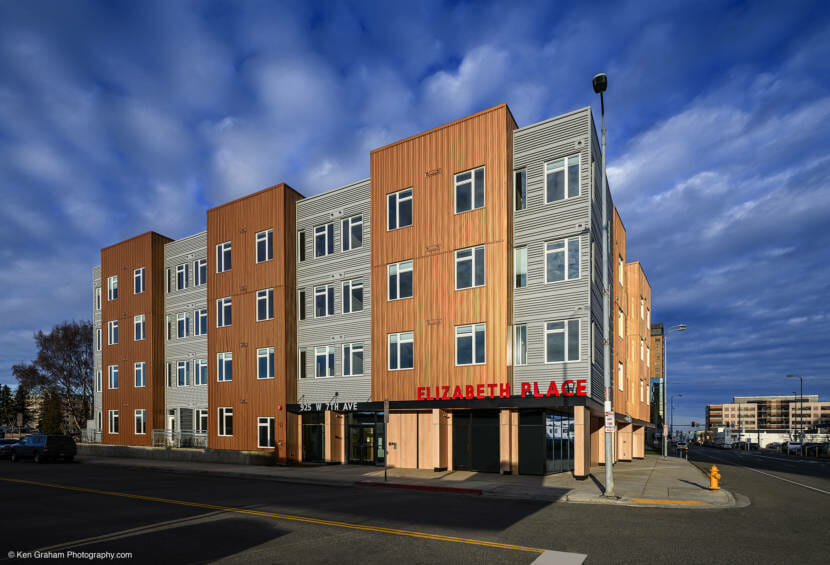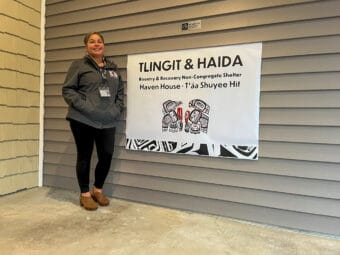
The federal eviction moratorium, which protected tenants who couldn’t pay rent from being kicked out of their homes, ended last month after a Supreme Court decision. But Alaska renters struggling to pay their landlords and utilities due to the COVID-19 pandemic have another option to receive support.
The Alaska Housing Finance Corporation opened another round of rental assistance applications last week. AHFC CEO Bryan Butcher says the corporation worked to get the first round of relief money out quickly. Butcher sat down with Alaska Public Media recently to explain how the process works.
Below is a transcript of the conversation, with minor edits for clarity.
Kavitha George: Could you describe the need for rental assistance in Alaska over the last few months? How has that been impacted by the end of the eviction moratorium?
Bryan Butcher: When we started the rent relief program with federal money this spring, we knew that there was ultimately going to be an end to the eviction moratorium, and there was really a focus on getting the process streamlined to get the funding out as quickly as we could. Of course, it never gets out quickly enough, but we were happy that we have pretty much led the nation — certainly per capita — in the amount of money that we’ve been able to get out the door.
We’ve gotten out more than $131 million to landlords and utilities. And so when the eviction moratorium ended, virtually all of the people that had applied to the program have had some money provided to catch them up on their rent and to pay into future rent and utilities.
We’ve also worked very closely with the court systems to make sure that if evictions do come into the court system, that they’re aware of our program. They can contact us and make sure that if somebody qualifies for help, and the funding hasn’t made it out yet, but it will be making it out, that they understand that and that eviction proceedings don’t start as a result of the fact that maybe there’s a lag between when applications come in and when the money actually goes out.
Kavitha George: How many Alaskans have taken advantage of the program already? And if a renter hasn’t yet applied, where do they find more information?
Bryan Butcher: The initial opening to sign up for the rent relief program was this spring, in March, and a third of all rental units in the state applied, which is both good news and bad news. The good news is we got the information out, and there probably aren’t a whole lot of people that needed the help that didn’t sign up for the help. The downside is that’s an awful lot of Alaskans that are really in financial need as a result of this pandemic.
Fortunately, we have the funds to help them out. And so we’ve reopened the process to have more folks sign up. They can sign up now on our website, alaskahousingrelief.org to find out if they qualify. Signup is through 11:59 p.m., Friday, Oct. 1.
Kavitha George: Who is eligible for rental assistance?
Bryan Butcher: You have to be at 80% of area median income for your community. And as an example, in Anchorage, that would be $77,840 a year, or $6,487 per month for a household. On the website, the first thing it does when you put in your information is it tells you if you’re eligible or not. So you really have to go on the website to find out for your community where that line is. But people that are at that point and have been detrimentally financially impacted by the pandemic would qualify.
Kavitha George: How does the assistance payment work? When you apply, if you’re approved, where does that money go?
Bryan Butcher: If you’re eligible, then we collect paperwork, and when we have your information — lease payments and other things — we then determine what we’re able to do for you. Those payments go to the landlords and to the utility companies, they don’t go directly to the renters. We want to make sure that whoever is owed the money gets the money paid on behalf of the renter.
Kavitha George: The application period that recently opened, is that for new applicants, or can people who had already received assistance apply again? How does that work?
Bryan Butcher: That is for new applicants. Those people that are in the system already are continuing to be processed. The federal rules for the program allow us to pay forward up to three months if they still qualify, but no more than that. Once your three months of assistance runs out, we then have a checking process to make sure you qualify and then you could be eligible for an additional three months. So this signup period now is for folks that either didn’t get their paperwork in, weren’t aware of it, or didn’t want to take advantage of it then, but want to take advantage of it now. So it should be a whole new group of people.
Kavitha George: There was a waitlist after the last round of rental relief applications. After this round, do you expect there will still be a waitlist? Will everyone who needs rent money be able to get it?
Bryan Butcher: That’s really the question that we’re not going to know till Oct. 1, when the signup closes. And then we start to go through how many people need help and what level of help they need. We may be in a situation where we have funds available and we can look at doing something else, or we may be in a situation where all the funds we have available then will be spoken for. So it really depends on what the numbers are, as they come in.
Kavitha George: What advice do you have for renters and landlords working through pandemic-related financial struggles right now?
Bryan Butcher: It’s really important that the renters and the landlords communicate with each other because the landlords, for the most part, if they have good renters, they don’t want to lose them. Not just because those are good renters that have had financial hardship, but also who else they may rent to in a recession caused by a pandemic — many people are in difficult financial situations. And so there’s really an incentive, I think, for a landlord to want to work with the tenant. But communication between the two of them so that landlords don’t unilaterally make decisions to move forward on things without being aware that financial assistance is coming, would be difficult for both of them.
Kavitha George: Anything else you’d say to someone who’s on the fence about applying?
Bryan Butcher: Just that sometimes people have said, “Well, you know, if Alaska doesn’t use all this money, it can go back to DC and it can reduce the debt or it can reduce income taxes,” and that’s not the way the program works. Any money that Alaska or other states don’t use goes back and gets redistributed to California or Texas or states that have more of a need. So it’s really important that if Alaskans have a need and this is an opportunity to get them out of a financial hole they’re in, that they take advantage of it, because if it doesn’t benefit Alaskans, it’s just going to benefit somebody someplace else.



